Horizons Q&A
We sit down with the developers to discuss this upcoming fantasy role-playing game.
Some years ago, developer Artifact Entertainment announced Horizons, an ambitious massively multiplayer game that was to include new features that had never been seen before in an online role-playing game. Among other things, the game was to feature an enormous world, a third of which was underwater (and habitable only by water-dwelling player races), as well as playable dragon characters. In recent years, there have been changes at the company and in the game's focus. A lot of the more outlandish features (like the underwater areas) have been scrapped.
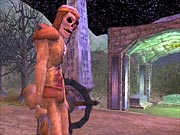
However, the developer has tried to hold on to as many interesting ideas as possible, and it is using them with a game engine that lets you create distinctive-looking characters who can wear many layers of clothing and armor. We last saw Horizons in motion at E3 2002, where we had a look at the game's good-looking graphics and its "secondary geometry"--the 3D representations of animated, solid objects for special effects, like an impressive tornado magic spell. We also saw that Horizons will still feature playable dragon characters, though we were only able to view dragons at a great distance. What adventures and quests can we expect from Horizons' colorful fantasy world? What about the game's trade skills and social elements? And, most importantly, what will the dragons be like? We sat down with Artifact Entertainment co-president David Bowman and producer Steve Snow and discussed these and other questions.
GameSpot: Thanks for taking the time for this interview. As we saw and heard at E3, Horizons has been through some pretty radical changes--the underwater areas and races from the original design have been cut, for instance, as have the story and background ties to Artifact's previous game, Demise. What would you say are the biggest changes that have been made to Horizons since its original design was drafted?
David Bowman: We have taken many of the ideas from the original drafts and evaluated them in light of the technology and the company's goals. The result is a realizable design that solves many of the problems in existing massively multiplayer games and provides new experiences that no other technology will match.
The single biggest change would be the focus of the product on the player's interaction with the dynamic environment and the computer-controlled opponents. We would not be able to say that if we were still splitting our attention between player vs. player gameplay and player interaction with the environment. When we release our player vs. player product, it will be the number-one product of its type.
Steve Snow: Another big direction change that's been made to Horizons is increasing the ease of play. We are streamlining our systems to support intuitive conclusions as to how things work and interact with one another.
GS: As we saw at E3, even though players will create and play as a single character at a time, as in other online RPGs, Horizons will allow for a great deal of customizability, even in a character's appearance. Can you discuss how the Horizons engine will let players layer clothing and armor on their characters? Are there any plans to allow players to import their own art, such as guild emblems, into the game?
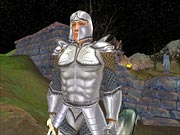
DB: Our client technology provides a theoretically infinite number of layers of player-worn items. Characters can have a brightly colored shirt that shows up under an extruded breastplate with just the edge of their new tattoo showing on their forearm. Of course, all these items are character-created items crafted using trade skills and resources. Player-created textures would need to be approved before being allowed into the game, but that is currently within the plans for the product.
SS: The only limitations on this system are the ones that we stipulate. You can do some really interesting things here, but we will provide some guides for the users, such as tattoos only drawing over skin, not clothing and armor.
GS: Can you discuss Horizons' use of polygonal geometry (in addition to standard effects, like particle trails) for its special effects, such as the tornado spell? Are there any plans to let player characters affect the actual physical world of Horizons--for instance, by destroying part of a mountain or hollowing out a crater in the ground?
DB: Artifact's developers have combined their programming and artistic skills to produce the most fantastic spell effects in any game. The particle system is robust and extensible, and combined with the fully animated secondary geometry, it produces spectacular effects. Real-time permanent deformation of the world's geometry is possible and will be permitted, but it needs to be strictly controlled to prevent characters from producing inadvertent results. A great deal of control is available to players over their owned property, including changes in geometry.
SS: Stepping away from polygons and terrain specifically, let's discuss the ability for players to own plots of land and build structures. We'll place plots to prevent haphazard placement of buildings. But having multiple players building a town, or even a city, is possible and a goal of ours. Once a town is established, it becomes a part of the world, and it shows up on maps, links to the transit system, and performs all the other basic functions of a normal town. This also means that the town opens up to assaults from monsters, which is one of the really exciting things for me, personally.
A Fight on the Horizon
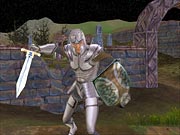
GS: One of the most immediately obvious differences between Horizons and other online RPGs is the fact that characters and monsters will actually score hits on each other while fighting, instead of swinging their weapons at the air near each other. Why did the team decide to actually show characters getting physically hit with attacks? How much blood and gore will be shown in fights in the final game, and are you at all concerned that the depiction of combat might affect the game's ESRB rating?
DB and SS: Horizons has the client technology to present fantastic images, and we chose to tackle the difficult problem of more-realistic animation sequences. It is difficult to do, but the results will force anybody who wishes to compete in this space to do the same. The first time I saw a dwarf in the game twist his body to evade the sword blow of the zombie and then return a blow that flung the zombie's loosely attached head backward, I knew that the days of weapons passing through characters with no effect were over.
How much gore are we going to show? We are approaching each market individually. Some of our international partners will want a no-gore version for their market. Parents will want to have control over the level of gore represented in the game. The default will be no gore present. Parental controls will determine the degree to which it can be dialed up.
GS: Previously, we were shown how characters will be able to queue up to five different skills to be used in successive rounds of combat. Can you explain how the queuing works? Can players change their tactics on the fly? Will there be any combat skills that will be based on careful timing or keying attacks off successful hits or parries, like in Dark Age of Camelot?
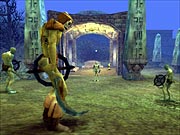
DB and SS: The challenge we faced was designing a system that didn't pretend that latency doesn't exist. We know players will always experience latency as long as they are using the Internet. So, we didn't go for a twitch-based game. Once combat is initiated, players have the choice of changing the nature of the attack they are using. The change occurs at the next possible time interval. All attacks have some padding in their timing that allows for adjustments to the display of the attack. A player can choose from the skills and equipment that their characters have, and from special attacks that their characters have learned in their school. These special attacks can be launched during the combat sequence and will occur on the server at the next appropriate time interval. They will be displayed on the client in the next available animation interval.
GS: How will character advancement work in Horizons? Will characters have set classes, or simply lots of different skills that anyone can learn? Will characters improve in skills through repeated use, or by spending points while gaining levels, or both? How will Horizons' character development be different from that of other games?
DB and SS: In Horizons, characters enter schools. These schools fall into two categories: adventure or trade. It is possible (but not required) to be in both a trade school and an adventure school, but not two schools of the same category. Each school has several skills. As characters gain more experience, it is applied to the school they are currently in. So, if the experience is gained through an adventure action, it is applied to the adventure school. If it's gained through a trade action, then it is applied to the trade school. As the experience accumulates, it is applied to all the skills within the school, but not necessarily equally. In addition, if characters tends to use a specific weapon or tool, they gain a specialization bonus with that item. Characters can change schools by approaching a new schoolmaster at any time. There are prerequisites for some schools that characters must have achieved before they will be accepted into the school. These schools are referred to as prestige schools.
Schools exist for all the current roles in Horizons. New schools will continue to be added in response to players' desire for more roles. Since a character can change schools and thus improve whatever particular skill they desire, there is no player regret about choosing a role. If you discover that you've chosen a role that doesn't appeal to you, or you just want to experiment, then change schools. Schools exist for combat and the trades. If you wish to be the greatest smith in all the land, then join the school and ply your trade. You will gain experience and improve your skills, and since characters create the best items, you will have a market for your goods. If you wish to prospect for ore or wander the lands building up character-owned communities, there are schools for you.
Building a Community
GS: The E3 demo also gave us a look at Horizons' intriguing trade skill system, which involves harvesting dynamically placed resources and crafting them into items. Can you describe your plans to distribute raw resources throughout the world of Horizons?
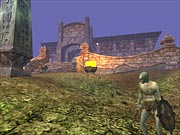
DB: The resources are distributed throughout the world following rules that we are evolving. It is important that they are not just randomly distributed, since that would make players feel that they wouldn't have a fair chance of locating such resources. As resources are extracted from the environment, they become depleted in one location (the node is removed) and are redistributed elsewhere. Certain skills and spells allow characters to improve their chances of locating their desired resources. Some resource nodes are mobile and provide renewable resources--for instance, sheep provide wool. Some resource nodes are only available in areas with hostile computer-controlled characters nearby. Others are in civilized lands and can be gathered without fear. The gathering of resources and the construction of items or structures with those resources will give characters trade experience.
SS: While David pointed out that a few resources can be found in hostile areas, another thing to point out is that, as a tradesperson, you will be able to advance fully without getting involved in combat. You just won't be able to make everything without help from combat-centric folk.
GS: We also got a look at Horizons' intriguing character shop system at E3, which will let players create and "advertise" their own businesses in towns. Will players be able to purchase or build housing for their businesses and also their personal use?
DB and SS: Characters can acquire property, upon which they can build a wide variety of structures. These property plots are part of a broader community, and as the community is built up by the players, computer-controlled characters begin to provide additional construction. It is possible to go from a wild area to a civilized community with all public conveniences. If you decide to build a house and a trade shop on your plot and you can afford it, then go ahead. If you want to decorate your house, plant a garden, and add a forge and anvil to your shop, go ahead. If you want to advertise your shop's services, turn on the advertising icons and let other players know what you make or sell.
GS: Can you discuss Horizon's quest system? How does the team plan to improve upon the generally simple fetch-this-kill-that quests that are so common in online role-playing games? Will players be able to grant their own quests?
DB: The quest systems are still being developed. We have the functionality of existing games, but wish to explore more dynamic quest development. We will discuss this more as we implement and test the components.
GS: The single most intriguing aspect of Horizons is the fact that the game will let players play as dragons. What can you tell us about them? Will dragon characters be immediately available to new players? Will they be able to participate in normal player activities, such as hunting, questing, or practicing trade skills? Will players who choose dragon characters have to earn more experience points than other races to advance their characters?
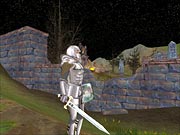
DB: We recognize the fact that players want to be dragons. We are spending a great deal of resources on developing that experience so it is satisfying. We are treating dragons differently than all the other races. Players are able to play as dragons when they start the game, but they begin as juvenile dragons. Juvenile dragons do not have the ability to fly. Dragons have many of the same schools available to them as other races, but they are dragon versions. Obviously, dragons will not be wearing all the same equipment as the other races, but they do have scales, teeth, and claws. Dragons can also learn breath attack abilities. Dragons can participate in quests and other activities that other characters do. The exact advancement of dragons will be discussed later as we prepare for beta, but it should be said that an adult dragon and an ancient dragon are far more formidable than a juvenile.
GS: Artifact Entertainment has seemingly changed its stance toward Horizons considerably in the past year. Previously, the company seemed focused on developing the game, and now there are plans to make the Horizons engine available for licensees. Why the change of plan?
DB and SS: Of the companies that have created massively multiplayer games to date, all of them focused on creating just one product without much forethought about using their technology for future products. This resulted in them having to rewrite their engines for all their next attempts at games. Most just chose to rewrite their clients and let their first-generation server attempts stand for their next products, but it cost them millions to rework their technology.
Artifact Entertainment is focused on creating a technology that allows for rapid creation and extension of massively multiplayer worlds. We have spent a great deal of money and effort to create that technology. Of course, we want others to be able to take advantage of the powerful nature of this technology too. That is just good business.
GS: Finally, is there anything else you'd like to add about Horizons?
DB: Horizons will be a great game built by a great team. There is an entire world to explore and shape. This is not the flat backdrop that first-generation games were forced to produce. The world is created by developers and shaped by the players.
SS: We have dragons, amazing spell effects, community building, reactive combat, and many, many more unbelievable things. We would have none of these things if we didn't have the team we have today.
GS: Thanks to both of you for your time.
Got a news tip or want to contact us directly? Email news@gamespot.com
Join the conversation